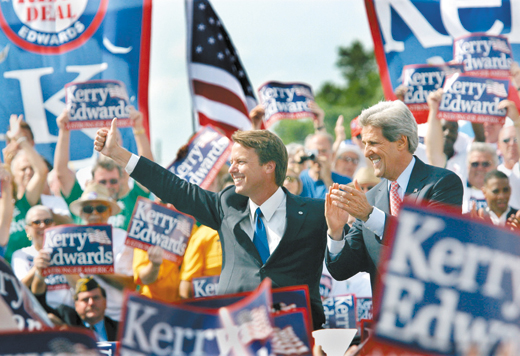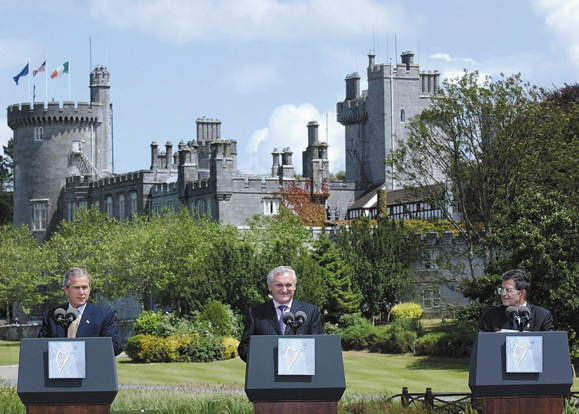As the 2004 United States Presidential Election Approaches, Irish Americans want to be informed of the candidates’ policies on Irish issues. Deanna Turner approached President George W. Bush and Senator John Kerry about their positions on immigration, the recent deportations of Irish republicans, the new U.S.-U.K. extradition treaty, the Good Friday Agreement, and what the future may hold. The Kerry campaign decided that the Kerry / Edwards statement on Ireland covered all points, while the Bush campaign answered all the questions.
℘℘℘
Senator John F. Kerry
John Kerry believes the ties between the United States and the island of Ireland are deep and abiding. The Irish contributed to the building of America – both Scots-Irish Protestants who arrived on these shores as far back as Colonial times, and the numerous Irish Catholics who arrived in the mid 1800’s, fleeing famine. And the United States has played an important role in Ireland’s development. The Clinton administration’s historic role in the Northern Ireland peace process, and the role played by American business in the creation of the “Celtic Tiger,” were pivotal contributions in recent history. More than 38 million Americans claim Irish ancestry, and Ireland is an important ally of the United States. As president, John Kerry will work to maintain, and continue to strengthen, this important relationship. John Kerry will put the Northern Ireland peace process high on America’s foreign policy agenda. On this issue, he will continue to follow the path set by Senator Kennedy, President Clinton, and Senator Mitchell. John Kerry was one of the first members of Congress to sign Senator Kennedy’s 1994 letter urging President Clinton to grant Gerry Adams a visa. That initiative led to the I.R.A. cease-fire and subsequent peace process. He supports the full implementation of the historic Good Friday Agreement, and commends the parties in Northern Ireland and the Irish and British governments for bringing about, with the judicial guidance of Senator Mitchell, this best opportunity for lasting peace and justice in Northern Ireland.

John Kerry believes that President Bush has failed to recognize the importance of building on the work of President Clinton in facilitating the peace process. There was not a U.S. ambassador in Ireland for more than a year. President Bush’s lack of urgency in naming a new ambassador to Ireland and the absence of presidential involvement in efforts to further the peace process are clear evidence that Ireland is not a high priority for the Bush Administration.
The Good Friday Agreement has produced many positive developments. Sectarian killings have largely come to an end. An assembly for Northern Ireland has been established, allowing the people to select their own government. Demilitarization has begun. Decommissioning by the I.R.A. has begun. A new police force has started to be developed – a force which hopefully will soon command the support of everyone in Northern Ireland. A North-South Ministerial Council, a British-Irish Council, a Human Rights Commission, and an Equality Commission have been created. While these developments have met with varying degrees of success, there can be no question that these efforts amount to a forward-moving path.
While applauding these developments, John Kerry understands that much more remains to be done. As a supporter of the need to hold the recent elections for the Northern Ireland Assembly, he believes that repeatedly suspending democratic institutions is not the way forward for Northern Ireland. He urges all parties involved to work for the earliest resumption of the assembly. And he believes that the review of the Belfast Agreement must be just that – a review, not a renegotiation. The problem is not the structures of the agreement itself, but rather the failure of all to fully implement it. The DUP cannot be permitted to disenfranchise half the population of Northern Ireland by refusing to form a government with Sinn Féin. It must be remembered that 70% of Northern Ireland’s citizens voted for pro-agreement parties. All other aspects of the agreement should continue to be fully implemented and not put on hold while discussions proceed.

Normalization must continue. The human rights agenda must be implemented. It is equally important that the I.R.A. take further substantive measures of decommissioning. The guns are silent, which is a positive step, but the guns must be removed forever and an end must come to all paramilitary activity – both Republican and Loyalist. John Kerry’s administration will stand ready to assist the British and Irish governments and all of those who work for peace, justice, and democracy in Northern Ireland. And as president, he will stand ready to play whatever constructive role may be of use to the parties, recognizing that most of the hard work remaining to be done must be carried out by the people of Northern Ireland and the two governments. The U.S.’s relationship with Ireland is important beyond the issue of Northern Ireland. With more than 500 U.S. companies with a presence in Ireland, that country is commercially important. The recent success of indigenous Irish companies has also led to Irish companies creating more than 100,000 jobs in the U.S. and has resulted in Ireland being a large investor here. The many economic benefits to be reaped by a Northern Ireland that is politically stable and seen to be a safe place to live and work can only increase U.S. business ties to the entire island. John Kerry’s administration will support these growing business ties, which bring economic benefits to all. As an English-speaking country with great familial and cultural ties to this country, Ireland serves as an important bridge between the United States and the European Union. John Kerry looks forward to working with the Irish government in what will be a much-needed effort to repair American ties with Europe, which were greatly damaged in President Bush’s handling of the situation in Iraq.
Finally, the relatively free flow of citizens, be they immigrants, vacationers, business people, or students, has been of great benefit to both Ireland and the United States. John Kerry supports a proposal that will allow undocumented immigrants to legalize their status if they have been in the United States for a certain amount of time, have been working, and can pass a background check. This makes sense for the economy, provides fairness to people in our communities who have worked hard and paid taxes, and will also allow the United States to strengthen its homeland security by bringing undocumented workers out of the shadows and into the light of greater accountability. John Kerry is also aware of the deportee cases and will pay close attention to how these cases develop over the coming year.
℘℘℘
President George W. Bush
DT: What is your view of the peace process in Ireland?
GB: The peace process in Northern Ireland is a model for conflict resolution. It demonstrates that long-simmering disputes can be resolved, and free and peaceful societies can emerge for the interest of the people who have been involved in those disputes.
Recent years have seen historic progress thanks to the tireless efforts of Taoiseach Bertie Ahern, British Prime Minister Tony Blair, and many other people who long for peace. We share a common vision – a lasting peace for the people of Northern Ireland, that will allow them to live free of terror and intimidation.
I believe that all parties can, and must, build on the progress of recent years, so that the people of Northern Ireland can replace old resentment with new cooperation and hope. During my visit to Northern Ireland in April 2003, I met with the Taoiseach Ahern and Prime Minister Blair, I personally reaffirmed America’s commitment to the Good Friday Agreement, and to its full and complete implementation. The United States has strongly supported their efforts to achieve a lasting and peaceful settlement in Northern Ireland. Among other things, I appointed a Special Envoy for Northern Ireland, who is participating in the peace process. Promoting a lasting peace in Ireland is a very important issue in my administration, and our nation stands ready to help.
Under my administration, the United States continues to support efforts of the Irish and British governments to restore the democratic process in Northern Ireland and to fully implement the Good Friday Agreement. The United States is engaged in dialogue with all parties, in coordination with the American embassies in Dublin and London, the U.S. Consulate in Belfast, and the Special Envoy for Northern Ireland. At the same time we are promoting economic growth in Northern Ireland. Peace fosters an environment where entrepreneurship and business creativity can thrive, where jobs will be created, and where prosperity will follow. The governments of the United States, Ireland, and the United Kingdom have agreed to work together to explore ways to encourage the flow of investment to Northern Ireland.
The United States is committed to Northern Ireland’s economic development. To date, the United States has given or pledged contributions of more than $300 million to the International Fund for Ireland. The fund provides grants and loans to businesses to improve the economy, redress inequalities of employment opportunities, and improve cross-border business and community ties.

DT: Ciaran Ferry is currently being held in a Colorado jail. His attorneys say he was arrested without a warrant on January 30, 2003 and is being held for political reasons. Mr. Ferry, an ex-Republican prisoner, was kept in solitary confinement for over nine months in Denver County Jail at the request of the FBI, the Board of Immigration Appeals, and Homeland Security. In your opinion, what can be done to help Mr. Ferry and his American family seek justice?
GB: U.S. law provides many checks and balances to ensure that fair and just results are achieved in all cases. Mr. Ferry is currently availing himself of several of these options.
DT: Many Irish immigrants who were involved in the past struggle in Ireland are under deportation proceedings. They fear they will be discriminated against and possibly murdered if sent back to Ireland. Their American wives and children are worried about their future. What is your position on these immigration policies?
GB: The United States government grants asylum to individuals who are unable or unwilling to return to their home countries because of persecution or a well-founded fear of persecution on account of race, religion, nationality, membership in a particular social group, or political opinion. If granted, asylum prevents an individual’s deportation or removal to the country in which it has been determined that he or she is likely to be persecuted. Any individual who is granted asylum can live and work in the United States, and can apply for permanent residency after a year.
Many Irish Americans fled to the United States to escape violence and persecution resulting from political unrest and actions by paramilitary groups. Through the efforts of Irish, British, and American leadership, we are working to minimize the violence in Northern Ireland and establish political stability that will allow many individuals to return to their homeland.
DT: What is your position on individuals who may have already been deported back to Ireland but had been in this country for years and had existed as peaceful citizens?
GB: Deportation and removal occur when individuals have violated the immigration laws of the United States. I support the asylum provisions of the Immigration and Naturalization Act, which protect individuals from being deported or removed to their country of citizenship if it is demonstrated that they are likely to be persecuted there for their political beliefs. However, individuals who have been deported for violating the immigration laws generally are not eligible to apply for readmission to the United States for a period of 10 years. Where individual circumstances warrant a departure from this general rule because of humanitarian or other concerns, previously deported individuals may apply to the Secretary of Homeland Security for a waiver of the general bar.
DT: Under the Good Friday Agreement, the British government released many prisoners who had been detained for their political beliefs. What is your position on allowing these people to immigrate to the US?
GB: My administration welcomes the immigration of individuals who meet the applicable criteria for admission and who wish to become a part of and contribute to American society. Individuals who are subject to persecution on account of race, religion, nationality, membership in a particular social group, or political opinion are also under certain circumstances eligible to apply for entry into the United States as refugees.
To immigrate to the United States, individuals must be considered admissible under the Immigration and Naturalization Act. An individual who has been detained but not charged generally is not rendered inadmissible. Furthermore, purely political offenses do not constitute crimes which would bar admission under the immigration laws. Aliens who are determined by the United States to have engaged in terrorist activity, however, or who are shown to be members of a foreign terrorist organization as designated by the Secretary of State, are ineligible for admission to the United States. I believe that the rule excluding terrorists and members of terrorist organizations from admission to the United States is appropriate and important to the United States’ national security.
My administration has taken great care to ensure that individuals are not unfairly or arbitrarily classified as terrorists or otherwise unfairly denied admission, and will continue to uphold high standards of accuracy and fairness during my second term.
DT: Many Americans are concerned with the implications of the Extradition Treaty between the United States and Great Britain that was introduced in the Senate on April 19, 2004. What is your position?
GB: I strongly support Senate ratification of the new extradition treaty between the United States and Great Britain, which will replace the outdated 1972 extradition treaty (and the 1985 supplementary treaty). The new treaty will modernize extradition procedures between the United States and Great Britain, bringing them into conformity with other extradition treaties that have recently entered into force for the United States. Article 4 of the treaty explicitly prohibits extradition for purely political reasons. The new treaty retains the standard U.S. extradition treaty requirement that Great Britain can seek extradition only for offenses that are recognized in the United States as a crime punishable by one year or more in prison.
DT: In the past, Irish citizens coming to the U.S. on speaking tours or personal visits have been denied entry to the U.S. What is your position on these situations and what stance would your administration take on allowing access to these individuals?
GB: To receive a visa for entry into the United States, an individual must be considered admissible under the criteria set forth in the Immigration and Naturalization Act. My administration has taken great care to ensure that individuals are not unfairly or arbitrarily denied visas for admission, and will continue to uphold high standards of accuracy and fairness, so that law-abiding Irish citizens can continue to enrich America.
DT: What advancements in the peace process do you plan on achieving during your term in office?
GB: First and foremost, we are working to minimize the violence in Northern Ireland and establish political stability that will allow many individuals to return to their homeland free of fear. My administration has separated immigration services from immigration enforcement to improve customer service, and has implemented a $560 million plan to reduce the processing time for all immigration applications to no more than six months by 2006. I have also proposed to reform the immigration laws with a new temporary worker program that would help make immigration to the United States more orderly, safe, lawful, and humane. ♦


Its so funny to read these stories and to think, has anything changed? Mostly the political debate goes and goes and only gets some new flavour.